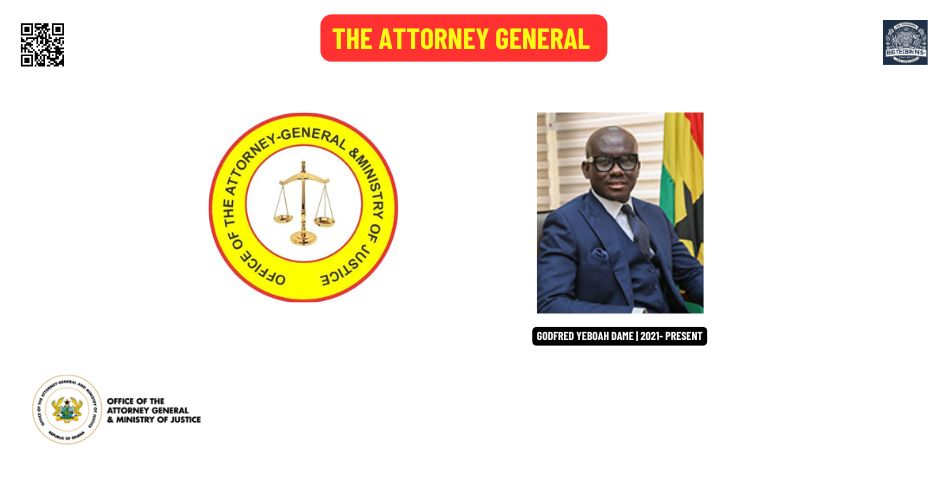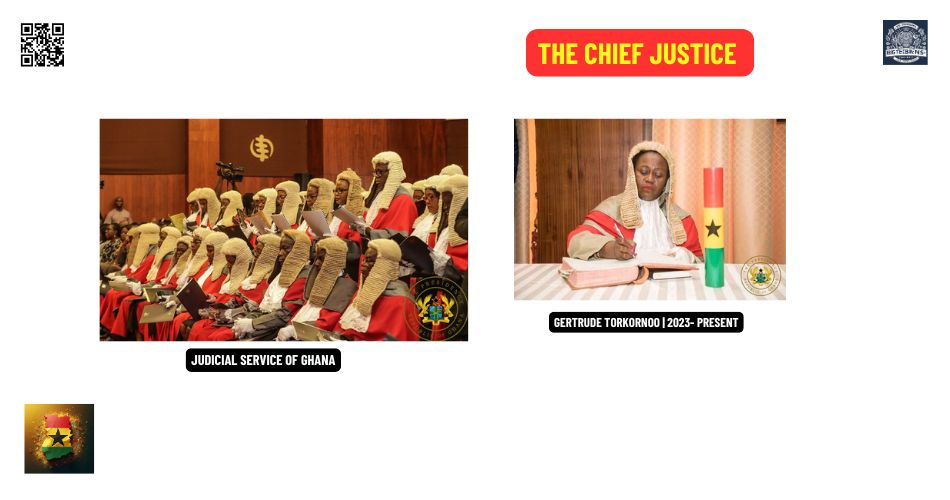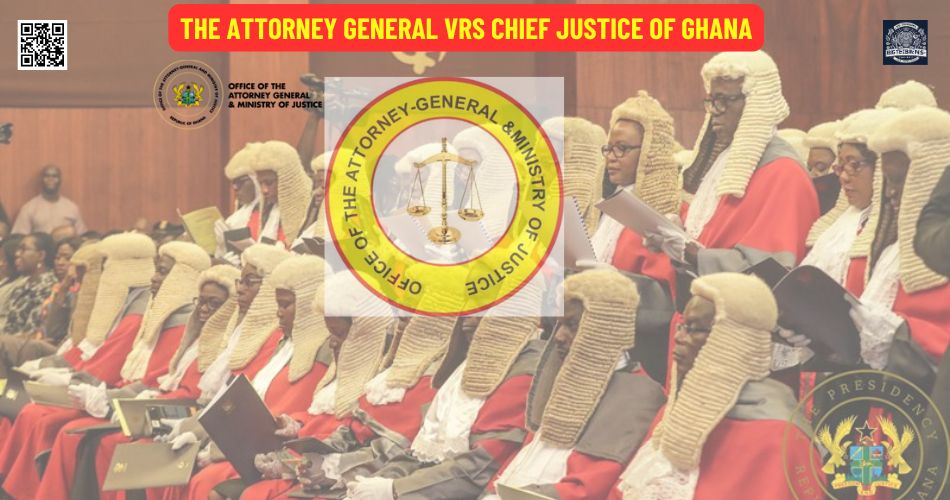Introduction
The Attorney General (AG) and the Chief Justice (CJ) of Ghana are two pivotal legal figures in the country’s governance and judiciary. While both play vital roles in upholding the rule of law, their mandates, ranks, and responsibilities are distinct, reflecting the separation of powers under Ghana’s 1992 Constitution.
The Attorney General of Ghana

Role and Responsibilities
The Attorney General is the principal legal advisor to the government and leads the Ministry of Justice. The AG is responsible for drafting laws, representing the state in legal matters, and overseeing public prosecutions.
Key functions as outlined in Article 88 of the 1992 Constitution include:
- Advising the President and other public offices on legal matters.
- Initiating and conducting all civil cases involving the state.
- Acting as the prosecutor in criminal matters.
- Ensuring effective legislative drafting for government policies.
Appointment and Accountability
The AG is appointed by the President of Ghana and must be approved by Parliament. As a cabinet member, the AG is directly accountable to the executive branch and Parliament.
Institutions Under the Attorney General’s Office
The AG oversees several legal departments and institutions, such as:
- The Registrar General’s Department.
- Legislative Drafting Division.
- Public Prosecutions Division.
The Chief Justice of Ghana

Role and Responsibilities
The Chief Justice is the head of the judiciary and the Supreme Court of Ghana, serving as the final interpreter of the Constitution. The CJ ensures the independence of the judiciary and is responsible for the administration of justice across the country.
Key duties include:
- Presiding over cases at the Supreme Court, especially constitutional matters.
- Supervising the judicial system, including lower courts.
- Swearing in the President and Vice President.
- Advising the Council of State on judicial matters.
Appointment and Accountability
The CJ is appointed by the President in consultation with the Council of State and must be approved by Parliament. Unlike the AG, the CJ is independent of the executive and legislature, reflecting the judiciary’s autonomy.
Institutions Under the Chief Justice’s Supervision
The CJ oversees all courts in Ghana, including:
- The Supreme Court.
- The Court of Appeal.
- The High Courts.
- The Judicial Training Institute.
Comparing the Attorney General and the Chief Justice
| Aspect | Attorney General (AG) | Chief Justice (CJ) |
| 1. Mandate | Legal advisor and prosecutor for the state. | Head of the judiciary; ensures judicial independence. |
| 2. Appointment | By the President, with parliamentary approval. | By the President, in consultation with the Council of State and parliamentary approval. |
| 3. Accountability | Accountable to the executive and Parliament. | Independent; accountable only through constitutional processes. |
| 4. Key Functions | Drafting laws, public prosecutions, and legal advice. | Supervising courts, interpreting the Constitution, and administering justice. |
| 5. Office Dependencies | Ministry of Justice and various legal departments. | Supreme Court and all subordinate courts. |
Historical Overview
Attorney General
- The office of the AG dates back to Ghana’s colonial era, with roots in the British legal system. Post-independence, the AG’s role was incorporated into Ghana’s governance structure under the 1957 Constitution.
Chief Justice
- The position of Chief Justice was created during the colonial period but gained prominence after Ghana’s independence in 1957. The CJ became instrumental in upholding constitutional democracy and legal reforms.
Relationship Between the AG and the CJ
Though their roles are independent, the AG and CJ occasionally collaborate:
- The AG relies on the judiciary, headed by the CJ, to adjudicate cases involving the state.
- The CJ ensures that the judiciary remains impartial, even in cases where the AG represents the government.
Conclusion
The Attorney General and the Chief Justice, though operating within different branches of government, play complementary roles in maintaining Ghana’s democratic order. The AG provides the legal foundation for executive actions, while the CJ ensures judicial oversight and independence. Together, their functions embody the principle of separation of powers, fostering accountability, fairness, and justice in the governance of Ghana. Their collaboration and adherence to constitutional mandates are essential for upholding the rule of law and protecting citizens’ rights.
FAQs: Attorney General and Chief Justice of Ghana
1. What is the main difference between the Attorney General and the Chief Justice?
- The AG is a political appointee responsible for advising the government and prosecuting cases on behalf of the state, while the CJ is an independent judicial officer overseeing the courts and constitutional interpretation.
2. Who appoints the Attorney General and the Chief Justice?
- Both are appointed by the President. The AG requires parliamentary approval, while the CJ’s appointment involves consultation with the Council of State and parliamentary approval.
3. Can the Attorney General influence the Chief Justice?
- No. The CJ operates independently of the AG, as mandated by the Constitution, to ensure judicial impartiality.
4. What institutions work under the Attorney General?
- Departments such as the Registrar General’s Department, Public Prosecution Division, and Legislative Drafting Unit function under the AG’s office.
5. Who is the current Chief Justice of Ghana?
- As of 2024, the current Chief Justice is Gertrude Torkornoo.
6. What challenges do the Attorney General and Chief Justice face in Ghana?
- Challenges include political interference, limited resources, delays in legal processes, and ensuring judicial independence in politically sensitive cases.
References
- Ghana Constitution, 1992 – Available Online.
- Ministry of Justice and Attorney General’s Department – Official Website.
- Supreme Court of Ghana – Judicial Service Website.
- Lodoh, A. K., A Guide to Ghana’s Judiciary System, 2018.

